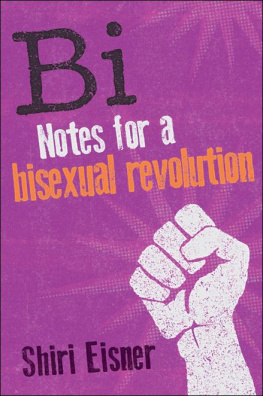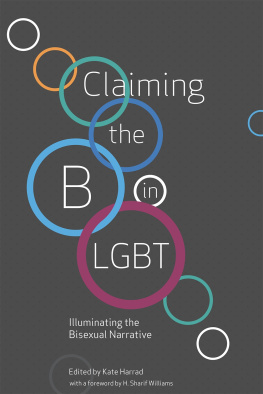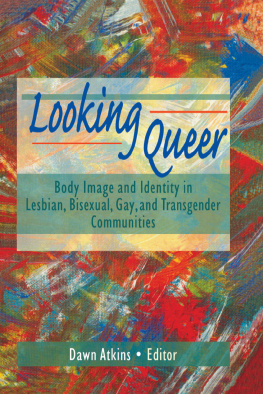
BI
Notes for a Bisexual Revolution
Copyright 2013 Shiri Eisner
Published by Seal Press
A Member of the Perseus Books Group
1700 Fourth Street
Berkeley, California
www.sealpress.com
All rights reserved. No part of this book may be reproduced or transmitted in any form without written permission from the publisher, except by reviewers who may quote brief excerpts in connection with a review.
Library of Congress Cataloging-in-Publication Data
Eisner, Shiri.
Bi : notes for a bisexual revolution / by Shiri Eisner.
pages cm
ISBN: 978-1-58005-475-1
1. Bisexuality. I. Title.
HQ74.E35 2013
306.765dc23
2012047200
10 9 8 7 6 5 4 3 2 1
Cover design by Erin Seaward-Hiatt
Interior design by Domini Dragoone
Distributed by Publishers Group West
Contents
I hope theyre revolting against our methods. I think its the duty of every generation to revolt against the older generation and to go further. My expectation is that they ought to have a higher level of consciousness than I did, because theyre standing on our shoulders.
David Lourea, bisexual activist (19451992)
I started doing bisexual activism in 2009, after many years of being active with the radical queer, feminist, and Palestine solidarity movements. Up until then, I had no idea that these two places in my headbisexuality and activismcould connect. I (as well as my bisexual friends) were all active in those movements, organizing and participating in projects that changed events and politics. Throughout this time, we kept talking about our bisexuality, about erasure and biphobia in our communities, and wondered why no one was doing anything about it. I remember waiting for years for something to start, all the while never thinking about bisexual activism as an option.
In 2008, the first bisexual support group in Tel Aviv was started by Elad Livneh, a long-time bisexual activist and one of two people running Bisexuals in Israel, a Jerusalem-based organization active between 2004 and 2007. From the moment I heard about the new support group (while marching with the first transgender block in the Jerusalem pride march), I became so excited that the two dots had finally connected. Very quickly I found myself writing about bisexuality, distributing fliers, promoting the support group, and organizing groups and events of my own. Within a year I had published an article in a book (Getting Bi: Voices of Bisexuals Around the World, second edition), was regularly publishing texts online, had founded a bisexual film club, organized the first bi/pan block in the Tel Aviv pride parade, started an Israeli bisexual online mailing list, and formed the second-ever bisexual and pansexual organization in Israel/Occupied Palestine, PanoramaBi and Pansexual Feminist Community.
At around the same time, my learning about bisexuality started as well. I swallowed up anything I could get my hands on: anthologies, articles, booksboth academic and political. As my knowledge expanded, my bisexual politics deepened with it. Very soon I found that I needed to explain it to everyone else. I knew why I did bisexual activism, but if I wanted to encourage others to join me, I had to elaborate. I opened a bisexual blog in Hebrew, and later in English. But one of the first things I discovered was that no matter how much I wrote, everything seemed partial, like fragments of a bigger whole. I also discovered that I not only had unique views about bisexuality, but also unique knowledgesince I had read so much about bisexual politics and theory, I was able to draw on information that most people didnt have access to.
For a very long time, I had a vague idea that one day I would write a book about bisexuality. At first, I didnt know what it would be about, but later it grew into an outline. One day I sat in the kitchen with my girlfriend, Lilach, and told her (for what must have been the millionth time) that I had a book in my head. Unlike the previous times, this time her response was: Write it. And I did.
This book is about why I do bisexual activism. Its the full explanation that I could never quite provide on either of my blogs. Everything written in this book, no matter how theoretical or academic, informs everything I do as a bisexual activist. As such, I view this book as a field guide. No matter how theoretical it is at times, the theory doesntand shouldntremain on the pages alone.
This is the first book to attempt a distillation of a coherent radical, rather than liberal, bisexual politics. The word radical stems from the Latin radix (root), and denotes anything relating to the root. In the case of politics, this signifies an examination of the roots of oppression in society. As opposed to liberal politics, whose goal is to gain access to social power structures, radical politics criticizes these very structures and ultimately seeks to take them apart. As opposed to liberal politics, which prioritizes hegemonic viewpoints and top to bottom change, radical politics prefers marginalized points of view and bottom to top solutions. While liberal politics presumes that the system (whether social, political, economic, and so on) is basically okay and simply needs a few corrections, radical politics recognizes it as the very source of oppression. According to radical politics, liberation cant be gained by further contributing to these systems or by requesting them to extend their control. Rather, what needs to be done is minimize their control and finally tear them down. Radical politics is not about receiving rights, protection, or privilege; it is not about inserting small changes in the system so that it works better; it is not about changing legislation and waiting for the effects to trickle down. Instead, radical politics is about the revolution.
What a radical viewpoint might offer for bisexual politics is an opportunity to examine and oppose bi peoples oppression, as it pertains to the roots rather than the surface. So far, the main goal of mainstream bisexual movements in North America and Western Europe has been to become accepted by society and to gain rights. But instead of looking at things from a birds-eye view, as liberal politics does, this book attempts to shed light on how things look down below in peoples lives. It also tries to uncover the reasons these things happen, and show how, rather than being isolated, they relate to other forms of oppression. Rather than trying to normalize bisexuality, this book tries to extract its enormous subversive potential, and utilize it to break down social order and create a revolution.
In keeping with radical politics preference for marginalized viewpoints, this book is also strongly queer, feminist, antiracist, and trans-inclusive. Where it can, and where appropriate, it reaches out to those and other groups, examining intersections between them and bisexuality. This comes from the understanding that no one struggle is complete without connection to others. Oppression of any one group doesnt happen in isolation, but parallels, draws from, and intersects with that of others. Further, these types of oppression dont only exist in the outside world, separate from various communities and movements, but also affect them from within. For this reason, ignoring other types of oppression in favor of single issue politics means reinforcing them. This is why the book constantly takes care to make these connections alongside examinations of monosexism and biphobia.
Next page





